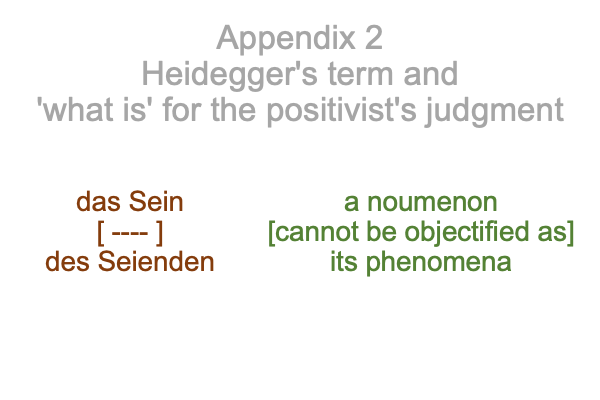0134 The English word, “education”, arises from two Latin terms, meaning “to train” and “to lead out”.
Perhaps, German is superior to English in simultaneously evoking more than one kernel in a single word. In German, word-elements concatenate effortlessly. There could be a German word for “the relation of arbitrariness between langueand parole” or for “the impossibility of phenomena fully objectifying their noumenon“.
0135 Does German-speaking Martin Heidegger hold an advantage?
Maybe, maybe not. After all, he could not concatenate das Sein (Being) and des Seienden (beings). Oh, what am I saying? That is what he did, more or less. So, when I place Heidegger’s not-fully melded concatenation against what isfor science, I get the following juxtaposition.

0136 How curious.
Am I suggesting that Heidegger’s phrase, das Sein des Seienden (the Being of beings), conceals a contiguity, and that contiguity is the same as the one that applies to all scientific things?
0137 Recall, the noumenon is the thing itself. Its phenomena are its observable and measurable facets. Plus, according to Kant’s slogan, a noumenon cannot be fully objectified as its phenomena. This applies to all things in the natural sciences. Empirio-schematic inquiry observes and measures phenomena. Their noumenon is ignored.
By juxtaposition, das Sein is Being itself. Des Seienden are beings that we encounter in our daily lives. Plus, according to the implicit contiguity between these two real elements, Being cannot be fully objectified as beings that we encounter in our daily lives. This applies to all modern things.
0138 Plus, as discussed in the prior blog, during the early 20th century, hylomorphic structures that juxtapose with ‘what is’ in the Positivist’s judgment seem to be in style. The ground-breaking linguist, Ferdinand de Saussure, comes up with a similar structure, allowing me to say the following.
By juxtaposition, langue is language itself. Parole are spoken words that we encounter in our daily lives. Plus, according to the arbitrary relation between langue and parole, language cannot be fully objectified by speech acts. This applies to everything we say.
0139 What does this imply?
That is a good question.
